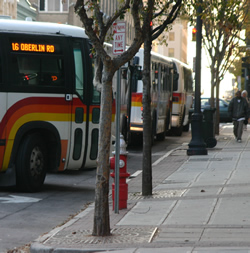Smokers who want to light up on the Moore Square Station platform will have to take a walk. Tuesday Raleigh City Councilors approved a smoking ban within 25 feet of any transit platform, including bus station at Moore Square.
The law came about after the Raleigh Transit Authority (RTA) adopted a “No Smoking” policy for bus platforms and other similar transit stops in January. The RTA asked the city to put the policy into city code.
The law will go into effect next week.
New Application Fee for Downtown Events
Event planners will now see an additional fee when applying for approval to hold an event in downtown Raleigh. City Council members this week approved a $50 application fee that will be collected by the Downtown Raleigh Alliance.
Councilor John Odom voted against the fee.
When planning an outdoor event in downtown Raleigh, organizers must apply with the DRA for approval. The DRA reviews the applicants and acts as a one-stop-shop for organizers. In the past this service has been free.
To offset the costs of handling the applications, the DRA will now begin charging a nonrefundable application fee of $50. The DRA processes about 100 event applications each year.
City Creates New Neighborhood Redevelopment Strategy
City Councilors approved a new strategy that will help redevelop and revitalize areas of downtown Raleigh.
There are nine areas with outstanding redevelopment plans, mostly located in Southeast Raleigh. In some cases, redevelopment plans for these neighborhoods – like the Thompson Hunter neighborhood – are 35 years old.
The new strategy would also consider economic development, as well as residential redevelopment. The strategy would also encourage private investment instead of relying solely on city funding.
The city’s plans for the neighborhoods would meet federal Housing and Urban Development guidelines so they would be eligible for federal funding.
City planning staff will begin creating prioritization criteria so that the first redevelopment area can be chosen. Planning for that first neighborhood will begin next summer.
